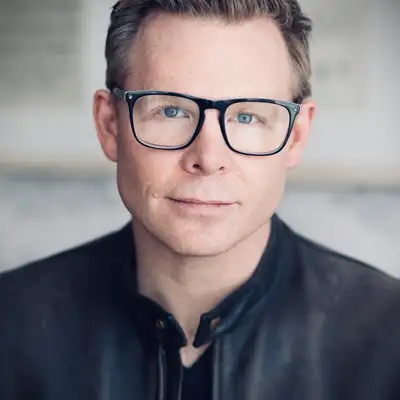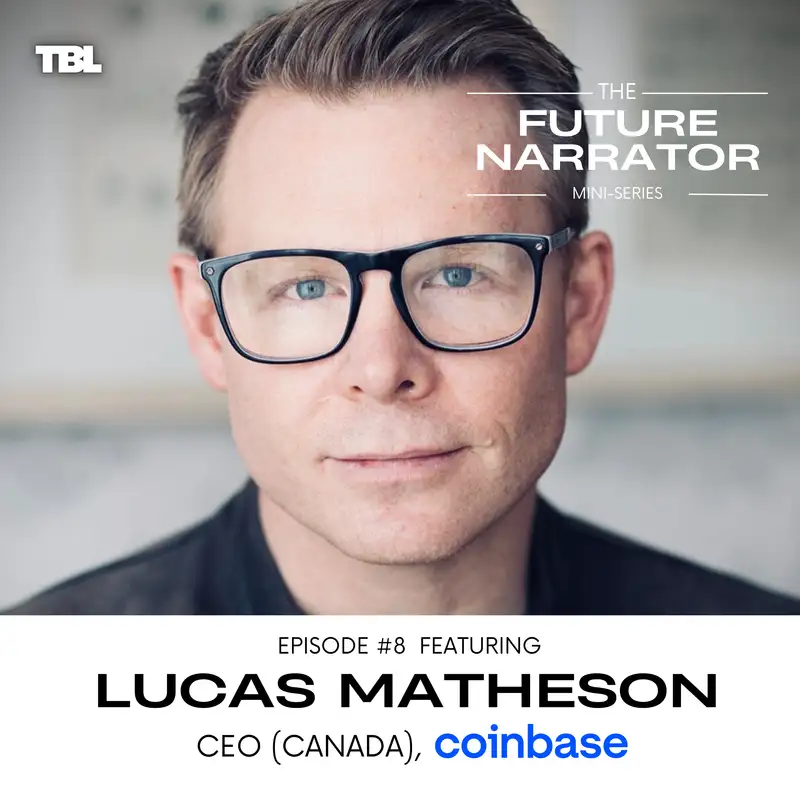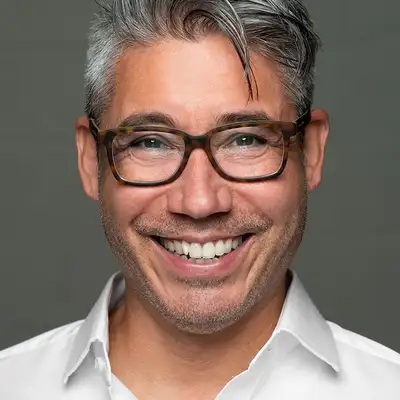Transforming Financial Systems: Lucas Matheson on the Future of Digital Assets
Salli: [00:00:00] You're listening to the business leadership podcast with Edwin Frondoso.
Lucas: What we're trying to do as a company is increase economic freedom by giving people all over the world access to the better financial technology and services.
New leaders are learning how to empower their employees. And their teams to own decisions to understand how to make decisions and empower them to make those decisions themselves so that companies can start making decisions and move faster.
Edwin: Good morning. Good afternoon. And good evening biz leader. Welcome to another episode of the business leadership podcast. And I'm your host Edwin Frondozo today we are featuring a special episode from our future narrator mini series. Which was recorded live at collision conference in Toronto, Canada.
In this mini series, we explore the future of leadership, innovation, and storytelling. [00:01:00] With visionary leaders who are not just designing products, but are creating entire new worlds and markets.
Joining me is Dr. Paul Newton and together. We are speaking with Lucas Mathison. He is the country director and CEO of Coinbase, Canada overseeing the company's strategic direction and growth within the Canadian market.
In our conversation, Lucas will discuss how Coinbase aims, increased economic freedom globally. By providing access to digital assets and blockchain technology. We'll also explore the importance of regulatory clarity
in the crypto industry and how Coinbase navigates global regulations, including recent developments in Canada.
So without further ado, here we go.
We're now speaking with Lucas Matheson of Coinbase. Lucas, how are you doing today?
I'm doing great, thanks. It's great to be here. I appreciate you having me.
Edwin: Yeah, I was super excited to connect with you and hear more about your leadership, I appreciate it. But let's just jump right in. [00:02:00] First off, for those who may not know, can you share what problem is Coinbase solving within maybe the financial and the blockchain industry?
Lucas: Yeah, absolutely. Coinbase was our mission as a company is to increase economic freedom in the world. And so when you look at Canada we have about 15 percent of Canadians who are considered underbanked or unbanked. Globally, we have 1. 7 billion people in the world who are considered underbanked or unbanked.
And I think what we're, trying to do as a company is increase economic freedom by giving people all over the world access to the better financial technology and services. And so Coinbase is a publicly traded Cryptocurrency exchange. We help customers get access to digital assets.
We also help institutions get access to digital assets and help their clients get access to digital assets. And then we also build for developers. So we built a layer two protocol on base on aetherium, and we help thousands of developers build applications on chain to build the future of the digital economy.
Edwin: It's [00:03:00] amazing. I'm also within the crypto space. That's something super exciting. I'm that crypto bros and excited to be here talking to you Lucas. Aside from just the change in financial and the opportunity that the crypto industry has created for everyone. From your point of view, what other major disruptions are shaping out the industry today?
Lucas: Yeah, I think one of the most important things for us in our industry right now is regulate, regulation and regulatory clarity. And so Coinbase has been operating all over the world trying to establish regulatory clarity and help governments and regimes establish regulatory clarity to ensure that this industry can grow successfully.
And in Canada we've been lucky. In one sense that we had an exchange here that was unsuccessful that went under a few years ago and our regulator stepped in and started regulating our industry. And so right now in Canada, crypto trading platforms like Coinbase are regulated and Coinbase was recently registered as a restricted dealer under a CSA.
We have 13 provincial regulators across our country and so Coinbase is now registered as a restricted dealer We're operating in [00:04:00] Canada and that's provided us an opportunity to build trust with government build trust with the public and build trust with institutions who are looking to get exposure to the asset class and also the technology to power? Some of the innovations that are happening in the space.
Edwin: Yeah, that's amazing and all the regulation has been pretty instrumental I guess within the last couple of months throughout the world. Did you see You And maybe you could share some insight when it got regulated in Canada, did that help open the doors and the rest of the world?
Lucas: So if you look at regulation around the world, we're seeing about 85 percent of regulatory bodies and agencies looking to enact legislation or regimes over the next 12 to 18 months. And so we're seeing a significant change around the world and how governments are coming together to enact legislation, to ensure that the traditional finance system and the updated financial system what we think of as decentralized finance can work together to help their citizens participate in the global future economy.
Edwin: That's big. It's big changes, [00:05:00] and I'm sure you know we could talk about just the adoption for everyone, but you know when it comes to leadership and Leading your teams your stakeholders your customers. How do you personally lead through these changes?
Lucas: Yeah, my, my leadership style is actually quite similar to what's happening in crypto right now. when you look at the traditional financial system that we operate in, it's fairly centralized around, power and control around traditional central centralization.
And I think it's the same with leadership. Traditionally, we've seen sort of one person at the top, With a suit on that has all the power, all the control owns, all the equity and makes all the decisions. And I think the world of leadership is moving to a decentralized structure where leaders are starting to empower people to make decisions and companies in general, spend their time trying to make great decisions quickly.
That's what innovation is. That's what entrepreneurs think about. How do we do more with less and make great decisions as fast as we can. And to do that new leaders are learning how to empower their employees. And their teams [00:06:00] to own decisions to understand how to make decisions and empower them to make those decisions themselves so that companies can start making decisions and move faster.
And that's really what we're doing in crypto is that we are empowering people all over the world with technology that treats everyone the same. That's transparent. That's secure. That's permissionless and I think that's very similar to how new future leaders are building their teams is by figuring out how to help them, figuring out how to empower them and help them figure out how to make great decisions as quickly as possible.
Edwin: First off, I love the term decentralized leadership that might have been personally for me is the first time I actually heard it phrased like that in terms of a leadership. And I'm curious when it comes to this decentralized leadership philosophy, is there any difference when it comes to the corporate structure or how you're personally leading your organization up here?
Lucas: Yeah, I think, transparency is a, solves a lot of incentive problems.
And I think in leadership now and in companies, we have the ability to help employees get access to better data to [00:07:00] make better decisions. And traditionally, a lot of employees were gated around financial data around user data within their respective companies. And that's changed a lot. We're seeing now in companies more access to better information that's empowering people to make those decisions.
And so I think data is a Currently becoming an incredible ingredient and helping people make better decisions. And that data is being democratized within companies to empower people to move fast and really understand where they're going and why they're making decisions and how those decisions are going to impact their respective businesses and their customers.
Edwin: I guess just thinking about that in the empowering and transparency, it really, for the leader also has to build in that trust and that courage to just let go, right? If it's traditionally people are like, if my people fail, it's reflected on me, but it's a different philosophy.
Lucas: Yeah. I think leaders used to, pretend to know everything, Leaders Felt that they needed to represent all the decision making within an organization now we have a younger [00:08:00] generation that is incredibly smart capable and Empowered leaders understand that they don't have all the answers their jobs aren't to make all the decisions anymore Their jobs are to help people make decisions help people understand how to make decisions Culturally and strategically within their organizations Everyone is speaking the same language and drumming the same beat around decisions.
Everybody gets more confidence and relying on their teammates and their leaders to, to make those decisions and move fast.
Edwin: When looking at, your goals as a leader, what current challenges are you facing and how are you looking to overcome them?
Lucas: I think our industry in general has faced some challenges with FTX and the collapse of a number of other institutions. our industry right now is really focused on building trust with the public, building trust with institutions and government. I think where our industry in Canada would like to see more engagement is from our government getting more political leaders educated and engaged in the, in updating our financial system.
Canada has It's one of the most [00:09:00] centralized economies in the world and it's important that we also participate in updating our financial system to keep ahead of the curve like most advanced economies in the world. And so I think the opportunity for us is around education. I think there's a lot of misconceptions in the world about what crypto is, about what decentralization is, how blockchains work and why they're powering the future financial system.
But we're seeing a lot of institutions around the world starting to adopt. Crypt digital assets, not just as a an asset class to get exposure for investment purposes, but more so the infrastructure to help solve some of the operational issues that they're having within their own respective companies.
And so I would expect, over the next couple of years, we'll see more use cases that will help build more trust and more engagement from political leaders and businesses Who understand the risks of cryptocurrency and digital assets and understand the opportunity of how to incorporate them into their businesses to help their customers and help them move faster and make better decisions.
Edwin: Yeah. [00:10:00] And what are you finding in these conversations now and in the education space? Are you feel getting the sense or feeling that people are slowly getting it? Or is it still an in an inertia state?
Lucas: There's a few segments in Canada. There's a segment in Canada of people who really understand digital assets and they've been along the ride for quite some time. I think the majority of Canadians are still relatively skeptical about the industry. They're still learning about why it's important. What crypto assets are, what digital assets are, how blockchains work and why governments around the world are coming together to enact legislation to ensure that this is a, an integral part of their respective economies.
Edwin: You might have mentioned it part of your vision or the ethos of of the company, but what does the future of crypto look like?
Lucas: Yeah, we think about, the future of crypto is being. Empowering individuals and financial freedom around the world. We think about it as being a transparent, we think about being inclusive and equitable.
As I mentioned, our mission is to increase economic freedom in [00:11:00] the world and empower people to make better financial decisions. And I think that's really the opportunity that we're seeing in Canada. But I will say in Canada, we do have credit cards. Most of us have a credit card in our pocket. We have a debit card ,we have a mortgage. And so we have a financial system that is working, but it's not going to help us stay competitive with the rest of the world as other economies around the world enact legislation to bring digital assets into their mainstream. Canada also needs to work to start the hard work to update our financial system and ensure that Canadians are well educated about what the opportunity is for them.
In general, since FDX, we've seen a lot of media in Canada focus on the risks and a lot of our government has been focused on the risk. Clearly our regulators have been focused on protecting consumers as they should be. And I think the opportunity now is to help more thought leaders, to help define champions in government, and to find people like yourself who are willing to introduce crypto to their audiences, willing to talk about digital [00:12:00] assets, willing to talk about, The future economy in Canada because it's important and it's important that we update our system.
Edwin: What I'm thinking right now with the vision of empowering the financial freedom, what would the world look like if that is achieved and everyone has, cryptos has been fully adopted?
Lucas: Yes, that's a great question. And I'll maybe share a little bit of a personal story a few years ago I found an artist on Instagram that I fell in love with. And eventually I reached out to him and asked if he would do a custom a picture for my daughter, a custom piece of artwork.
And he asked me for 500 dollars in bitcoin. I was a little bit uncomfortable so I got on a call with him to chat with him and realize that he was a 19 year old living in rural Nigeria. And he needed that Bitcoin because he didn't have a bank account. He could not accept any form of credit card or payment.
And here's an artist that in my personal, humble opinion is an incredible genius of an artist. He's somebody that if he lived in Canada [00:13:00] would be. He's very well known his work is incredible but he's somebody that's out in the world that's creating an incredible value for the world, but he's unable to monetize his efforts.
And I think that is not an equitable fair industry. That is not equal access. And I think as Canadians, we understand that, we start all start from a place of fairness and equality. And I think the future is a system where everyone can participate, where everyone has access to financial services and where that's the incentives of that system are designed to benefit us.
And I think the incentives of decentralized finance will help Tony Jagis, who is an artist who is making money with crypto currencies. And as crypto currencies become more mainstream, I expect he will Earn more money. But the truth is there there's 1. 7 billion people in the world like Tony who don't have access to financial services who are cut out of the system. And that's something that I expect crypto will have a significant impact on.
Edwin: That's really [00:14:00] inspiring. I love that story. Give me shivers actually Lucas in terms of how it's, the opportunity and what the future does look like. A final question. I'd love it if you could share for the business leaders, the executives, the founders that may be listening, any thoughts, recommendations, advice, it could be around leadership. It could be about crypto, anything that comes to mind right now.
Lucas: I can speak to Canada, I think in Canada, the opportunity for us is to learn how to thrive on change, change in Canada has been hard over the last few decades, and we have a lot of work to do in Canada to update our system, our financial system, but also incorporate more technology in the world.
And so if you're Canadian, I would say, we need to aim higher, we need to build faster, we need to change and we need to help our systems thrive. incorporate new technology so that we can stay competitive with the rest of the world. And so my advice to people is to continue aiming higher and not to settle for the status quo.
I think in Canada, we are killing ourselves with [00:15:00] kindness. We need to update our mindset and stay more competitive with the rest of the world and believe in ourselves and what we can do for the world and the impact that we can have. Ethereum as an example was founded in Toronto, founded here in Canada.
We have so much innovation in our country, so many incredible financial leaders. I'm excited for Canada's future and I'm hopeful that we can empower entrepreneurs and leaders around the world to think big and have a big impact for the rest of the world and for our country.
Edwin: That was amazing, Lucas. Really appreciate that. Thank you for joining us today.
Lucas: Great to be here and thanks for having me.
That's it biz leaders. Thanks for joining me on this special episode of the business leadership podcast. Part of our future narrator mini series recorded live at the collision conference in Toronto, Canada. This was an amazing conversation with Lucas Mathison. Exploring how Coinbase is working to increase economic freedom and navigate the complex regulatory landscape.
So for links. To all the resources that we [00:16:00] discussed to connect with Lucas and to learn more about the future narrator project. Check the show notes in their app.
If you're interested in reading more about Lucas and all the amazing business leaders that we profiled at collision, please do join the wait list for our upcoming book. If you found value in this episode, please do subscribe rate and share it with the very first person who comes to mind. That can benefit and be grateful from hearing from you.
Your support helps us grow and empowers us to bring you more great content. Thanks again for tuning in and being part of our community. Until next time have a 100 X day
Creators and Guests





